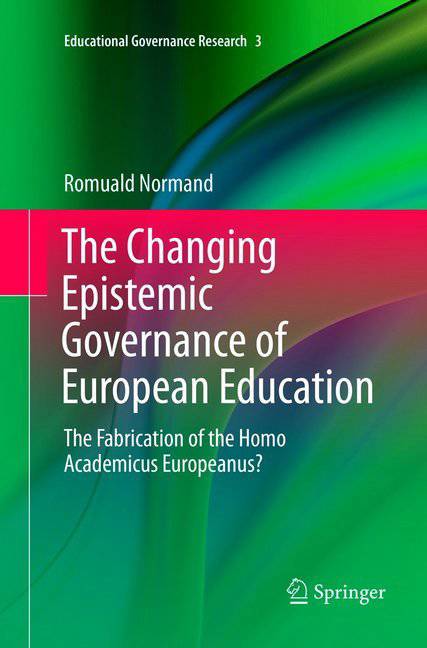
- Retrait gratuit dans votre magasin Club
- 7.000.000 titres dans notre catalogue
- Payer en toute sécurité
- Toujours un magasin près de chez vous
- Retrait gratuit dans votre magasin Club
- 7.000.0000 titres dans notre catalogue
- Payer en toute sécurité
- Toujours un magasin près de chez vous
The Changing Epistemic Governance of European Education
The Fabrication of the Homo Academicus Europeanus?
Romuald Normand
52,95 €
+ 105 points
Format
Description
This book examines the transformations of epistemic governance in education, the way in which some actors are shaping new knowledge, and how that new knowledge impacts other actors in charge of implementing this knowledge in the context of the decision-making process and practice. The book describes knowledge-based and evidence-based technologies that produce new modes of representation, cognitive categories, and value-based judgements which determine and guide actions and interactions between researchers, experts and policy-makers. It explores several major social theories and concepts, analysing the transformation of the relationship between educational and social sciences and politics. In the light of epistemic governance being linked to transformations of academic capitalism, the book describes the ways in which academics engaged in heterogeneous networks are capable of developing new interactions as well as facing new trials imposed on them by the changing conditions of producingknowledge in their scientific community and within their institutions.
Knowledge is power. It is materialized in metrics, policy instruments and embedded in networks. The governance of European higher education, insightfully argues Romuald Normand, is not structured by hierarchical public policies, by governmental exercise of authority or heroic decision making. Normand makes a sophisticated intellectual argument, building upon the work of Foucault, Latour (Sociology of science), and the pragmatic sociology of Boltanski and Thévenot (sociology of justification) in order to precisely analyse Europe's higher education through the circulation of ideas and instruments. Based upon precise research, the book is a major contribution to the understanding of high education in a capitalist Europe, beyond the simple idea of neo liberalism. Normand, provocatively, even suggests the making of a European Homo Academicus. This is an innovative and important book for publicpolicy, European Studies and the sociology of Education. Patrick le Galès, FBA, CNRS Research Professor, Centre d'Etudes Européennes, Sciences Po, Paris, France
Knowledge is power. It is materialized in metrics, policy instruments and embedded in networks. The governance of European higher education, insightfully argues Romuald Normand, is not structured by hierarchical public policies, by governmental exercise of authority or heroic decision making. Normand makes a sophisticated intellectual argument, building upon the work of Foucault, Latour (Sociology of science), and the pragmatic sociology of Boltanski and Thévenot (sociology of justification) in order to precisely analyse Europe's higher education through the circulation of ideas and instruments. Based upon precise research, the book is a major contribution to the understanding of high education in a capitalist Europe, beyond the simple idea of neo liberalism. Normand, provocatively, even suggests the making of a European Homo Academicus. This is an innovative and important book for publicpolicy, European Studies and the sociology of Education. Patrick le Galès, FBA, CNRS Research Professor, Centre d'Etudes Européennes, Sciences Po, Paris, France
Spécifications
Parties prenantes
- Auteur(s) :
- Editeur:
Contenu
- Nombre de pages :
- 235
- Langue:
- Anglais
- Collection :
- Tome:
- n° 3
Caractéristiques
- EAN:
- 9783319811154
- Date de parution :
- 31-05-18
- Format:
- Livre broché
- Format numérique:
- Trade paperback (VS)
- Dimensions :
- 156 mm x 234 mm
- Poids :
- 358 g

Les avis
Nous publions uniquement les avis qui respectent les conditions requises. Consultez nos conditions pour les avis.






